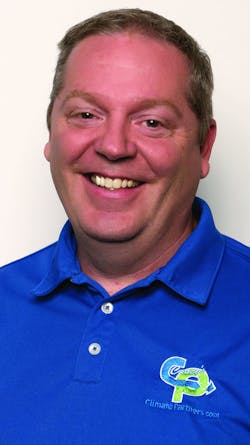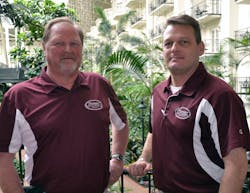Culture and Fit Lead to Consistent Customer Service
Tom Casey, CEO of Milford, Conn.-based Climate Partners, never considered another field other than HVAC contracting. He represents the third generation of the family-owned HVAC, plumbing and electric service business (climatepartners.com) that he runs with his father, Tom Sr., and brother Todd, who is the general manager.
“I love all aspects of the work,” he says, “the feeling of accomplishment when you’ve fixed something and solved a problem.” He has two other HVAC service businesses in Hilton Head, S.C., and Jacksonville, Fla.
In Knoxville, Tenn., Mike Conley is the general manager of Pioneer Heating and Air Conditioning (pioneercomfort.com). The company was named Contracting Business’ Residential HVAC Contractor of the Year in 2017.
Conley joined Pioneer by way of a local home builder he was working for. He had hired the HVAC service company to install heating and cooling equipment and was impressed with the professionalism of its technicians. After the Great Recession put a kibosh on residential home building, Pioneer’s owner, Gordy Noe, offered his friend Conley a job.
Home services businesses are based on three things: price, process and products, he adds. Having the lowest price in your market doesn’t convey a sense of quality and value; when contractors cut prices, they can’t properly develop their employees or hire new ones. Most likely the company culture is not conducive to retaining good people, so the recruiting process is based on desperation. Contractors who understand their costs of doing business and price their services accordingly can make good recruiting a priority.
Processes give technicians consistency when dealing with customers. “You can have great processes but terrible people,” Casey notes, “or terrible processes and great people. Neither will make you successful. Great processes combined with great people will.”
The types and brands of product are important, he says, but it is essential that HVAC service contractors provide the right mix of products and services their clients and their communities deem valuable.
“Your business should be based on customer wants,” Casey says. “Talk about the customer’s pain and how you can address it.”
Conley agrees: “If you walk through our building, you’ll find everyone thinking about how to serve the customer best, to make sure each customer is taken care of. Does it mean we install and fix every air conditioner every day? No, that’s impossible. But we make temporary fixes; whatever we can do to make a customer comfortable until we can get to him. We go that extra mile.”
Sales, installers, service techs, maintenance, customer service reps, office staff — everyone at Pioneer works together to give customers a top-notch experience. “We are fanatics about customer service,” he says. “It’s one thing we talk about every day and at every team meeting — it’s always about providing the best customer service.”
Not only do Pioneer employees “go that extra mile” for customers, but they also do so for their colleagues. Conley cites an instance where one of the office staff was diagnosed with breast cancer and underwent radiation and chemotherapy, which is a grueling process. The other office workers picked up the slack, insisting she take care of herself first.
Mike Conley: “If you built the right culture, have the right people on board and they are accomplishing that mission every day, I believe it will reflect the customer service at the end,” he explains.
Hiring for Attitude
Building the right culture means hiring the right people. For Casey, that means hiring for the right attitude.
“I’m not looking to recruit a superstar,” he says. “I want to train and build my own techs so they fit into the culture, into our way of doing things.”
Climate Partners offers internships to prospective technicians, where they learn about the trade, are trained on the technical processes they need, go on ride-alongs with master technicians and, eventually, enter into an apprenticeship program. Having that customer-centric attitude is critical for a Climate Partner technician; paying for technical education is a cost of doing business.
“We’re not fishing for people in the same pond other contractors are,” Casey notes. “I’m looking for solid citizens to represent my brands the right way. With the internship, I see who is serious about the trade and whether we can teach that person our processes and procedures while cultivating an attitude to serve people.”
Pioneer also looks for the right people to fit into its culture. “We’re constantly looking for those people,” Conley says. “Sometimes we hire people who we may not have a job for, but they have what we call the right personality for the company. We’ll find a place for them, train them. And once you have them, it makes everything so much easier.”
Part of Pioneer’s recruitment strategy is the “Ride and Decide” program (rideanddecide.com). Noe developed the program about four years ago. High-school students are paired with trade industry contractors and work through their summer breaks learning about that trade — while also getting paid.
“We make sure they see every aspect of the company — routine maintenance, service department, install,” Conley explains. “They go on a sales call and a marketing call, usually to a TV or radio station. They spend a couple of days in the office. Then they spend a day with the owner. So, they can see all the different jobs available in an HVAC home services company. If they’re not interested in being a service tech, there are plenty of career opportunities in other areas of an HVAC business.”
The Plumbing-Heating-Cooling Contractors-National Association adopted the Ride and Decide program and has expanded it into six states.
Technical training is important to keep technicians updated on the latest technology and codes. Pioneer also trains employees on customer service issues — how to deal with an angry customer, how to talk to a customer on the phone the proper way, how to treat customers with respect. “When employees see the company investing in them, they’re going to invest back into the company,” he says.
Kelly Faloon is a contributing editor to Contracting Business, Contractor and HPAC Engineering magazines.
About the Author

Kelly L. Faloon
Freelance Writer/Editor
Kelly L. Faloon is a contributing editor and writer to Contracting Business magazine, Contractor and HPAC Engineering. The former editor of Plumbing & Mechanical magazine, Faloon has more than 20 years experience in the plumbing and heating industry. She started a freelance writing and editing business in 2017, where she has a varied clientele.
Faloon spent 3 1/2 years at Supply House Times before joining the Plumbing & Mechanical staff in 2001. Previously, she spent nearly 10 years at CCH/Wolters Kluwer, a publishing firm specializing in business and tax law, where she wore many hats — proofreader, writer/editor for a daily tax publication, and Internal Revenue Code editor.
A native of Michigan’s northern Lower Peninsula, Faloon is a journalism graduate of Michigan State University. You can reach her at [email protected].



